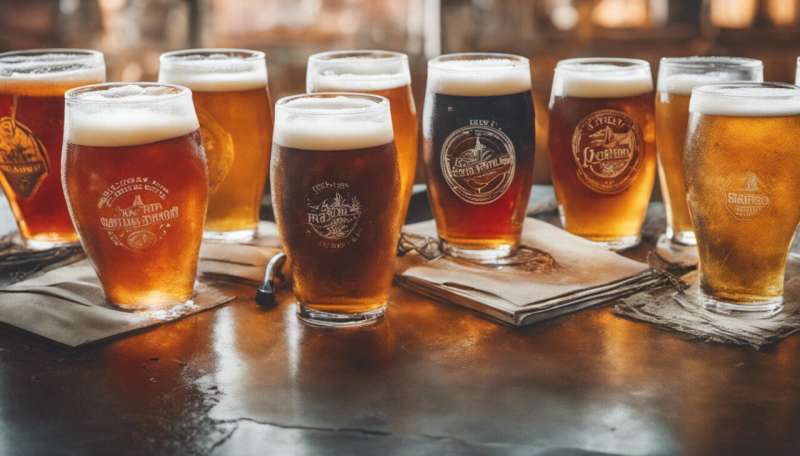This article has been reviewed according to Science X's editorial process and policies. Editors have highlighted the following attributes while ensuring the content's credibility:
fact-checked
trusted source
written by researcher(s)
proofread
Hotter, drier summers will make European craft beers less 'hoppy'—new study

September 2023 was the warmest ever recorded according to the EU Climate Service, with Earth's average surface air temperature peaking at 16.38°C. The average global temperature was also at least 1.5°C higher than pre-industrial levels on about a third of days in 2023, according to another recent report.
These are both indicators of accelerating climate change, the effects of which will be felt in all aspects of our lives. In a new study, for example, scientists have discovered that climate change will lower the quantity and quality of beer.
The main ingredients of beer are water, malting barley, yeast and hops. Hops (Humulus lupulus), a climbing, herbaceous perennial, gives the beer its aroma and flavor. Commercially, this crop is usually trained to grow up strings.
Like any crop, the climate (temperature, precipitation and hours of sunshine) determines how much hops grow and their condition at harvest time. The cultivation of high-quality aromatic hops is restricted to several relatively small regions in Argentina, Australia, China, Europe, Japan, New Zealand, North America and South Africa where the climate is suitable. Within this scattered distribution, cultivation is concentrated in Germany, the Czech Republic and Slovenia.
In this new study, researchers predicted that both the yield and quality of hops will fall as a result of higher summer temperatures and changes in rainfall patterns. The outcome is likely to be less hops and less beer, with a potentially duller taste and aroma.
Craft beers in crisis
In recent years, demand for flavourful craft beers has boomed. The flavor comes from the female hop flowers that grow in clusters called cones and contain bitter acids, essential oils, polyphenols and many other compounds which produce, when brewed, the aroma and taste associated with beer.
Some of these bitter acids, called alpha-acids, are the main source of the bitter taste of beer. Alpha-acids also protect the beer from becoming spoilt by inhibiting microbes growing in it and improve the stability of the foam that makes up the head on beer.
While alpha-acids begin developing as these conelike flowers start to form, 90% are produced in the last two weeks before harvest. Alpha-acid content is influenced by temperature, precipitation and sunlight duration. As average daily temperatures increase, the level of alpha-acids in the flowers decreases. At the same time, up to a point, the more rainfall there is, the higher the alpha-acid production.
What this means is that higher summer temperatures, along with drought and irregular rainfall, sap plant vigor and so result in lower yields and less alpha-acid. Also, to produce high-quality hops, cones must develop as daylight hours are decreasing, after the summer solstice. If the plants flower too early due to warmer temperatures, the daylight length may not be ideal for alpha-acid production.
The new paper compared the yield, alpha-acid content and cone development of hops with environmental data from Germany, the Czech Republic and Slovenia from 1971 to 1994 and 1995 to 2018, and predicted future trends to 2050.
From 1971 to 2018, average temperatures rose by 1.4°C and precipitation fell by 24mm. The rising temperatures over this period moved the onset of the hop-growing season forward by 13 days and the average onset of cone development now occurs between 13 and 31 days earlier, depending on the location. As a result, the critical ripening period—when alpha-acids develop—has shifted towards the warmer part of the season, lowering the average alpha-acid content of each cone.
By modeling future changes in cone yield and quality, the researchers predict a fall of 4–18% in yield and 20–31% in alpha-acid content by 2050. This would mean that there are less hops available to make the flavorsome craft beers that have recently become so popular and instead, beer may be less "hoppy" in its aroma and flavor.
Best served chilled
These predicted declines in the yield and quality of beer hops may seem enough to drive one to drink, but there is some hope.
In existing hop fields, changing the orientation of the crop rows so that they are not in full sun and using techniques to help the soil retain more moisture, like tilling it less, changing how fertilizer is applied, applying bark chippings or other mulches to cover the rows, could help crops weather droughts and heat waves in future.
More expensive solutions include installing irrigation systems. Applying growth-inhibiting chemicals or building protective shades could also slow plant growth so that cones form when conditions are optimal. Solar panels have been installed in some vineyards to shade grapes during hot weather and, of course, generate renewable energy.
Another approach involves breeding new hop varieties that retain a high alpha-acid content and other flavor-enhancing compounds in warmer and drier climates. Hop cultivation could also move to new locations. In the future, climate change may mean hops are grown at higher altitudes and latitudes and in valleys where the water table remains sufficiently high at critical times.
And so it's not quite last orders for the world's third most popular beverage.
Provided by The Conversation
This article is republished from The Conversation under a Creative Commons license. Read the original article.![]()

















